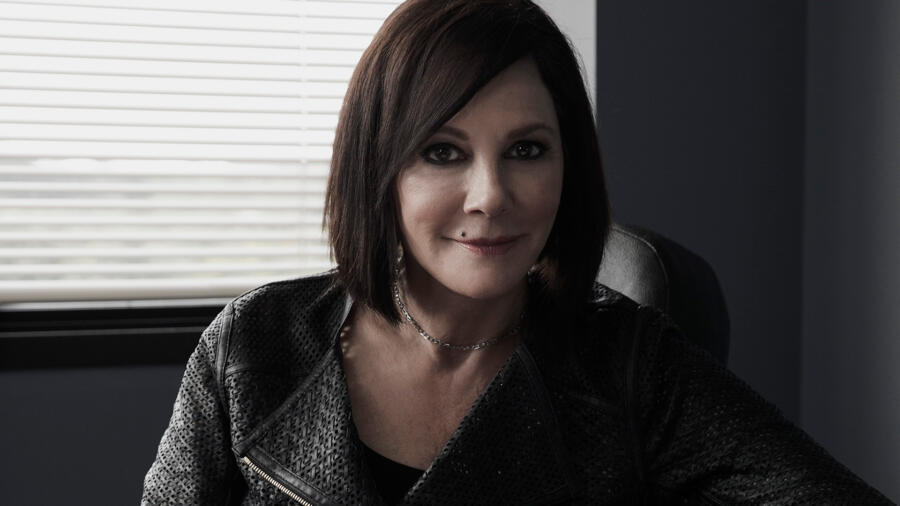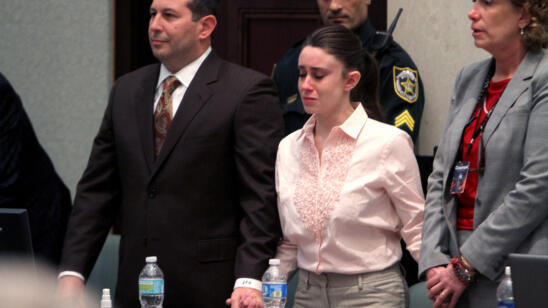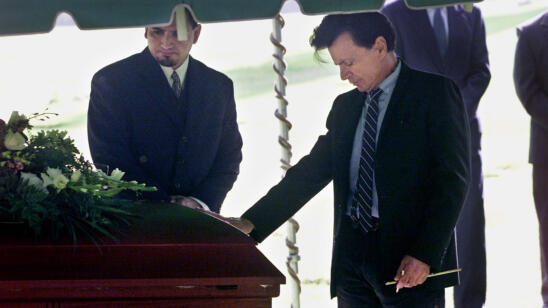In 1995, Marcia Clark rose to national prominence when she served as the lead prosecutor in the high-profile Los Angeles murder trial of O.J. Simpson. A powerhouse prosecutor, Clark had only lost one murder case before that, and won 19. Though much of the press spectacle centered on Simpson himself—the NFL star was eventually acquitted of murdering his ex-wife Nicole Brown Simpson and her friend Ronald Goldman, after 11 grueling months—Clark also found herself at the apex of a nonstop media maelstrom.
Clark and her co-counsel, Deputy District Attorney Christopher Darden, admittedly made mistakes during the course of the prosecution, but Clark was vilified in the press for things that had nothing to do with her work, such as her hairstyle, her outfits and her child-custody battle. Judge Lance Ito was also famously dismissive toward Clark in court and even advised the jury not to be distracted by Clark’s short skirts.
After Simpson was controversially acquitted of the double murders, in what many dubbed “the trial of the century,” a dejected Clark walked away from the law to become a best-selling crime novelist and screenwriter. But on Marcia Clark Investigates the First 48 Clark reinvestigates notorious cases, like that of Casey Anthony, Robert Blake and Chandra Levy, that left the public with scores of unanswered questions—and helps uncover new answers.
Clark spoke with A&E True Crime about the suffering she felt after the O.J. trial, why we’re fascinated by brutal crimes and why she’d make a good juror.
What was it about ‘Marcia Clark Investigates the First 48’ that you found most intriguing?
I had been a true-crime addict my whole life. Everything about this show is my perfect dream situation; we get to do an in-depth examination and reinvestigation of these cases to see what may have been missed. Even when I was a prosecutor, my favorite part [of my job] was going out in the field, talking to witnesses, investigating and digging into the cases. This show speaks to everything that is a real passion for me.
How did you decide which cases you wanted to focus on?
That was hard because there are so many fascinating cases to choose from. We decided for this first season to do notorious cases that are well known. We drilled down on the cases that seemed the most intriguing to us and looked to see if there were things about each case that the public really didn’t know. And we found that [these] seven cases provided plenty.
For example, in the Robert Blake case, I did not know that the murder weapon was found just a few feet away from the victim in a dumpster, in good working condition. I did not know that that gun was a vintage WWII gun with the serial numbers scratched out. It’s a key piece of evidence that’s literally the smoking gun in the case that tells you who…killed [Blake’s wife] Bonnie Lee Bakley.
How did you decide you wanted to become a lawyer?
I didn’t start out wanting to be a lawyer. It was something I eventually came to. I started my undergraduate [work] as a theater arts major—I wanted to be an actress. When I realized the realities of being an actress—that I probably would wind up being a waitress—I thought, ‘This is probably not going to be right.’ So I thought about what I liked to do, what intrigued me, and that added up to [becoming] a lawyer.
Within the first month of law school, I knew I was going to be a criminal lawyer, nothing else.
You originally started off as a defense lawyer. Why did you decide to switch gears and become a prosecutor?
There were a number of things that made me want to change. In the beginning, when I was defending drunk drivers and prostitutes and theft cases, that was one thing. But when I started to be involved in murder cases, it was tough because I really sympathized with the victims; that was part of it. I also wanted to be in a position of having power to make sure the cases were fairly handled in a transparent way. And as a defense attorney, you don’t have that power because all you’re doing is defending your client. You can’t make sure that everybody gets a fair plea bargain, for example, or a fair handling of a trial.
I also didn’t really care for private practice. I didn’t like doing the kind of thing you usually see lawyers do on TV, where they’re out trying to scare up cases and drum up clients.
Do you ever miss working as a prosecutor?
For the first few years after I left the office, I did miss it because it’s who I was. I had an identity crisis: ‘If I’m not doing that, what am I doing? Who am I?’ And when you do a job as important as being a prosecutor, it’s really hard to see anything else as being that important.
I remember [one time] I was covering the Robert Blake case for Entertainment Tonight. I was sitting in the box with all the other reporters, seeing the prosecutors in the courtroom and thinking, ‘I should be down there.’ Then I grew past that and got very involved in hosting and commenting on various crime shows.
[After that] I wound up going back to law, handling criminal cases that are on appeal for indigent defendants. The court appoints lawyers to represent them if they can’t afford a lawyer themselves after they’ve been convicted of a felony, so it’s kind of like being a public defender.
Later I started writing scripts in Hollywood and crime novels.
Had you been interested in writing before?
I wanted to write crime novels when I was a kid. I always loved the genre. But I never thought that you could make a living as a writer. I just didn’t have any faith.
When ‘The People v. O.J. Simpson’ aired, dragging the case’s key players back into the spotlight, what kind of changes did it trigger in your life?
When I first heard they were going to make that series, I was really miserable and upset. The last thing I wanted to do was relive the ongoing hell of [that] trial. I was really thinking no one would care [because] everybody was O.J.-ed out. When it did so well—it was crazy how well it did—I was shocked. And when I realized that [director] Ryan Murphy had decided to focus on the sexism in the case, I was doubly shocked because I never expected anybody to care about that, or remember it or notice that [had been] going on.
What do you think would happen if that case were tried today?
It seems like the national appetite for true crime has never been higher. In terms of the verdict, would that be the same? Well, probably.
I think a big part of the reason we got the verdict we did [was that] we went into it knowing that we would not be able to secure a conviction, that the very best that could happen would’ve been a hung jury. But because the case was so poorly run by a judge who was overwhelmed by celebrity and loved the limelight himself, the case dragged on and on, and took twice as long as it should have. That, plus some really terrible rulings on a daily basis that allowed the case and the evidence to be buried under a mountain of irrelevant nonsense, I think led to the acquittal.
[If] we’d had a good judge, we might have actually hung the jury.
The Simpson case caught people at a moment in time when racial tension was very high, in particular in Los Angeles, so shortly after the Rodney King riots. The racial tensions have not gone away; you see the police shootings…and a lot of the same divisions. In some respects, the divide feels even more pronounced today.
How did you handle the sexist backlash that was directed at you, both during and after the trial?
During the trial I was consumed with the trial, so I don’t think it got to me quite as much; I had a job to do. I knew the job I was doing was an unpopular one for many reasons. A lot of people didn’t like to see a woman in that position, prosecuting a famous and beloved football player. Then, of course, there was the endless media cycle that was always looking for something to say.
Afterwards I was suffering by myself with feelings of absolute misery because justice was not served, and two innocent people were brutally murdered.
Why do you think people are so fascinated with the kinds of brutal crimes covered in your show, like the Caylee Anthony murder?
I’ve asked that question…so many times. I can’t say I have a definitive answer.
Committing murder is the ultimate act, and few of us will ever come close to it. So there’s a mystery to [determining] what drives people to commit this ultimate act. How does someone get to that place? And then, on a more superficial level, it’s the allure of the mystery and the riddle: It’s solving a puzzle. That’s endlessly entertaining to people.
The most intriguing question about almost every murder case is the ‘why’ of it, not the ‘how’ of it.
Have there been any cases in the past few years that have really bothered you or stuck with you, other than the ones featured on the show?
I was very troubled by Trayvon Martin; I thought George Zimmerman was guilty. I didn’t agree [with that verdict].
When you follow high-profile cases in the news, do you try to reserve judgment until you’ve heard all the facts? Do you listen to the stories as a layperson or do you follow them with your lawyerly hat on?
I do listen like a lawyer. I can’t help it. I find myself really, truly reserving judgment, waiting to hear as much as I can find out. I’m always thinking, ‘Yeah, but what about the other side? Yeah, that’s what you say, but …’
Although no one would ever let me sit on a jury, I would probably be a good juror because I’m really unbiased, and I really do wait and withhold judgment until I’ve seen all the evidence.
Related Features:
Full Episodes: ‘Marcia Clark Investigates the First 48’
Marcia Clark on the Biggest Piece of Evidence Overlooked During the Casey Anthony Trial
Former Sex Crimes Prosecutor Linda Fairstein on the Case That Keeps Her Up at Night



